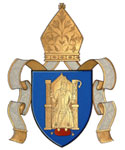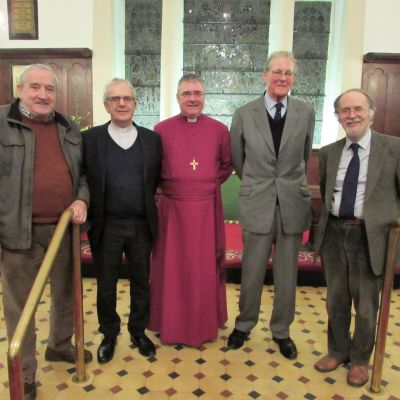 |
 |
News
Bishop's Roadshow on the Reformation
The Bishop of Clogher, the Right Revd John McDowell has travelled around the diocese delivering an address to parishioners on 'Some Aspects of the Reformation.'
Bishop McDowell presented his informal talk at three roadshows in St. Macartin's Cathedral, Enniskillen; St. Patrick's Church, Monaghan and St. Macartan's Cathedral, Clogher, hosted by the Dean and Chapter.
In 2017 many Christians will be commemorating the 500th anniversary of the Reformation.
During his informal talks, Bishop McDowell examined some of the key people and key developments involved in the Reformation which shaped Christian faith from the 16th Century. He explained how the culture and institutions of many countries in Western Europe were shaped by the Reformation. He went on to say that although the Church of Ireland had its roots from 4th and 5th Centuries it had been greatly influenced by the Reformation of the sixteenth century. 'In Ireland, as we know, the progress of the Reformation was very patchy and it was the only Kingdom in these islands which did not become predominantly Protestant. Again there have been all sorts of theories to account for that but it is undoubtedly true that as a national movement the Reformation failed in Ireland in the sixteenth century,' he said.
Looking at society in the era of Martin Luther in the early years of the 16th Century, Bishop McDowell said life was very public and life was also extremely fragile. 'People then were always living on the edge of an abyss; two bad harvests could result in famine,' he said. He described people as being more 'earthy' than they are now and would be considered 'coarse' in today's society.
Bishop McDowell said that in its beginnings the Reformation was very much a scholarly movement and that Luther's works ran to 120 volumes. 'The Reformation was a revolution started by scholars who were able to make use of the rediscovered skills of reading ancient languages, particularly the Greek and Hebrew of the Bible and other scholarly developments to engage again with the original biblical texts.
'Because the Reformation became a European wide movement these scholars wrote mostly in Latin so that they could understand each other. But not always. John Calvin could not read German and Martin Luther could not read French so they misunderstood many things about each other.'
Bishop McDowell said Luther was far from being the only reformer. 'There were many others such as Calvin as well as Heinrich Bullinger, Martin Bucer and Peter Martyr (who had much more influence in England and Ireland in their day) but there was often great disunity among reformers,' he said. The language used was often robust but also very difficult to understand.
Bishop McDowell said: 'In my view one of the reasons why Luther's theology appealed to many people in early modern Europe was because of the extraordinary precariousness of human existence and also the enormous resentment which had built up against the role of the church, and particularly the clergy, in everyday life.'
He concluded by outlining how parochial Luther's life had been, staying mostly in the same region of Germany apart from one visit to Rome.
Bishop McDowell said Luther often had to defend his teachings and refused to back down.
Martin Luther died in 1546 in the town of Eisleben in Saxony, the same town where he was born.

Pictured from left: Mr Gordon McLaren, the Revd Canon Maurice Armstrong, Bishop John McDowell, Lord Anthony Hamilton and Mr Jack Johnston.